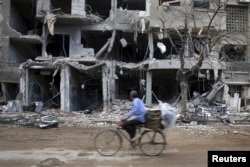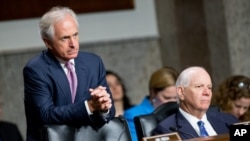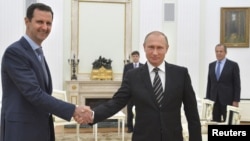U.S. Secretary of State John Kerry says talks later this week in Vienna on Syria’s future are the “most promising opportunity” in years for reaching a political solution in the war-torn country that has suffered four-and-a-half years of “nonstop horror.”
Rattling off the statistics - one in 20 Syrians has been wounded or killed, one in five is a refugee - Kerry said, “My friends, the challenge we face in Syria today is nothing less than to chart a course out of hell.”
Speaking Wednesday at the Carnegie Endowment for International Peace in Washington, Kerry said the U.S. is taking a two-pronged approach to Syria.
One is the diplomatic route. Preliminary meetings in Vienna are expected to begin Thursday, with formal talks convening on Friday, attended by Russia, Turkey, Saudi Arabia and the U.S. Iran also will be taking part in an international summit about the Syrian conflict for the first time. Kerry was due to leave for Vienna after his speech.
The second prong is intensifying the counter-Islamic State campaign being conducted by a U.S. led coalition. Kerry said the coalition will be resupplying moderate fighters in northern Syria, enhancing its air campaign and beginning to put pressure on Islamic State’s chief city of Raqqa.
“The president has made clear that we are determined to degrade [Islamic State] more rapidly,” he said.
U.S. lawmakers skeptical
Earlier Wednesday, U.S. lawmakers questioned the prospects for progress in multi-national talks about Syria’s political future, considering the gaps between the U.S. position and the views of Russia and Iran.
“It is hard to square .. the facts on the ground with the potential for some grand diplomatic solution,” Senator Bob Corker said during a Capitol Hill hearing on U.S. Middle East strategy.
Corker cited Russia’s continued airstrikes against the Syrian opposition, including some opposition groups that receive U.S. support, as a key reason for his skepticism. He also noted Iran and Russia's alliance of support for Syrian President Bashar al-Assad, who has been the focal point of the four-year cycle of bloodshed in Syria.
In addition, comments in Tehran Wednesday indicated Iran's position is still starkly at odds with the U.S. view of the situation in Syria.
At the Senate hearing, General John Allen told lawmakers the crisis in Syria is one of the most complex situations he has seen in his military career. Allen is a retired Marine Corps general who is special U.S. envoy assigned to counter the activities of Islamic State militants in Syria and other countries.
Corker asked Allen if the Obama administration could envision a situation in which Russian military units in Syria would focus exclusively on Islamic State targets in Syria, and exclude other Syrian opposition groups from their airstrikes.
Allen replied no, because Russia’s overall goal in Syria is to “stabilize” President Bashar al-Assad by fighting the opposition elements that pose the greatest threat to his regime.
In his speech, Kerry said that while the U.S. has big differences with Russia, there also are areas of agreement including a conviction that the status quo is untenable and that Syria can only be saved through a political settlement.
Talks part of broader effort
Iran’s Foreign Ministry said Foreign Minister Mohammad Javad Zarif and three of his deputies will take part in the talks. But there also were fresh signs that Iran and the United States remain far apart on the Syrian issue.
Iran’s top national security official, Ali Shamkhani, said the U.S. and its allies have been fighting for three years to get the Assad government to surrender. All the Western powers have achieved in that time, Shamkhani said during a visit to Islamabad, is a refugee crisis, a terrorism crisis and extensive damage to Syria’s infrastructure.
At this point, the Iranian official told reporters in Pakistan, “They have come to the conclusion that the Iranian point is right about seeking a political solution to the problem.”
U.S. diplomats do not expect a definitive conclusion to the talks this week. Instead, they expect there will be further rounds of talks about Syria’s political future.
Vienna is the first stop for Kerry on a trip that also will take him for the first time to Central Asian capitals and major cities - Bishkek in Kyrgyzstan; Samarkand in Uzbekistan; Astana in Kazakhstan; Dushanbe in Tajikistan; and Ashgabat in Turkmenistan.
Ayaz Gul in Islamabad was among a number of VOA reporters contributing to this story.








